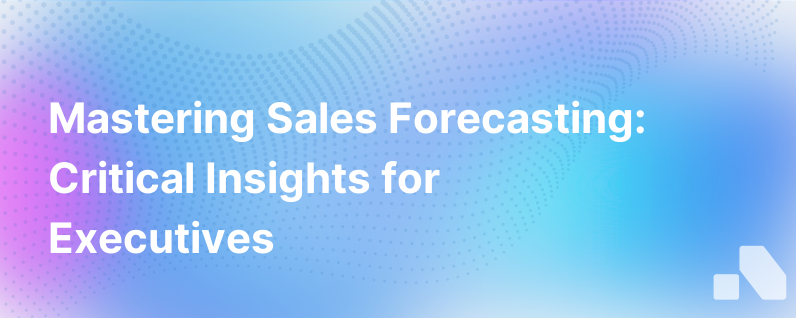
Forecasting is the linchpin of any successful sales strategy. It's the pulse-check on the state of a business, allowing sales leaders to predict revenues, make informed decisions, and steer their company confidently into the future.
But as we stand in an era where the data we rely on grows increasingly complex, traditional forecasting methods are becoming relics of the past, and businesses that cling to outdated models risk falling behind.
In this detailed exploration of forecasting, we'll examine the nuances and best practices of modern forecasting methods, focusing on the integration of technology and predictive analytics to enhance accuracy and drive revenue growth.
The Evolution of Sales Forecasting
Once, sales forecasting was a matter of experience and gut feeling. Sales managers would look at a range of simple indicators – past performance, current pipeline, economic conditions – and use them to craft a forecast rooted as much in hope as in analysis.
As we've transitioned into a data-driven age, the tools and techniques at our disposal have evolved. We now have access to vast amounts of data and cutting-edge technologies such as machine learning and artificial intelligence, which are reshaping how we approach forecasting.
The Importance of Accurate Forecasting
The stakes of forecasting are high, and accuracy is paramount. An overestimated forecast can lead to excess inventory, wasted resources, and a loss of shareholder trust. An underestimated forecast, on the other hand, can mean missed opportunities and a lack of preparedness to meet customer demand.
Here's why accurate forecasting is crucial for a business:
- Resource Allocation: Accurate predictions enable better allocation of resources, preventing overstaffing or understaffing, and ensuring capital is invested in the right places.
- Strategic Planning: Forecasting allows for strategic planning by giving a future outlook on revenues, helping to set goals and expectations for your sales team.
- Risk Mitigation: It helps anticipate market downturns and identify potential risks, allowing businesses to adjust proactively.
- Investor Confidence: Investors rely on forecasts to make decisions. Accuracy demonstrates control and insight, bolstering investor confidence.
- Market Competitiveness: In fast-paced markets, understanding your future position allows for nimble strategy changes, keeping you competitive.
Techniques for Modern Sales Forecasting
Here are some contemporary techniques in the world of sales forecasting:
Historical Analysis
In retrospect, a thorough examination of past sales data can indicate trends that may continue into the future. This forms the bedrock of most forecasting, though in isolation, it can be myopic, not accounting for new variables or market changes.
Pipeline Forecasting
This technique assesses each opportunity in your sales pipeline and estimates the likelihood of each deal closing. It's dynamic, continuously adjusting as new data comes in, but it relies heavily on the quality and timeliness of that data.
Multivariate Analysis
Multivariate models analyze several variables, like market trends, consumer behavior patterns, and macroeconomic indicators, which might affect future sales. This technique can be highly accurate but requires a sophisticated understanding of data analytics.
Predictive Analytics
A more advanced technique, predictive analytics harnesses machine learning and AI to analyze historical and current data to make predictions about future events. The models get smarter over time, learning from new information to refine their predictions.
Best Practices for Forecasting
To make forecasting work for you, follow these best practices:
1. Use a Mix of Methods: Don't rely solely on one forecasting method. Incorporate various data points and approaches for a more holistic view.
2. Regularly Review and Adjust: A forecast should be a living document, continuously updated with the latest data and insights.
3. Involve Multiple Perspectives: Different departments offer various insights. Cross-functional collaboration can enhance the accuracy of your forecasts.
4. Train Your Team: Ensure your sales team is well-trained in data entry and understand the importance of their contribution to the forecasting efforts.
5. Embrace Technology: Leverage modern sales analytics tools and platforms that can automate and improve the forecasting process.
The Role of Technology in Forecasting
With advancements in AI and machine learning, sales forecasting technology has reached new heights. Platforms like Aomni deliver real-time predictive insights, making forecasting faster and more accurate.
AI-driven technology can crunch large datasets, detect patterns too subtle for the human eye, and adapt predictions based on new information. This not only improves precision but also frees up your sales team to focus on what they do best – selling.
An AI platform like Aomni doesn't just provide a static forecast; it keeps you attuned to the ebb and flow of your business landscape. This dynamic analytics ecosystem accumulates data from various sources to offer a multidimensional view of your sales pipeline's future.
Conclusion
In the rapidly changing landscape of B2B sales, forecasting remains a critical yet challenging aspect of business strategy. By leveraging new technologies and predictive analytics, businesses can obtain unparalleled insights and accuracy in their sales forecasts.
Remember, successful forecasting isn't about predicting the future with absolute certainty; it's about reducing uncertainty to a manageable level where informed, strategic decisions can be made confidently. It's about being prepared for multiple scenarios and having the agility to pivot when required.
Innovative forecasting tools like Aomni redefine the boundaries of what is predictable, allowing businesses to stride boldly into the future with a clear vision of the road ahead. With intelligent, data-driven forecasting, the direction of your company rests not on the caprices of chance but on the solid bedrock of informed strategy.